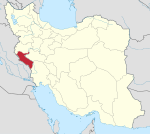Kalan Rural District
Kalan Rural District Persian: دهستان كلان | |
|---|---|
| Coordinates: 33°53′29″N 46°05′57″E / 33.89139°N 46.09917°E[1] | |
| Country | Iran |
| Province | Ilam |
| County | Eyvan |
| District | Zarneh |
| Capital | Kalan |
| Population (2016)[2] | |
• Total | 2,484 |
| Time zone | UTC+3:30 (IRST) |
Kalan Rural District (Persian: دهستان كلان) is in Zarneh District of Eyvan County, Ilam province, Iran. Its capital is the village of Kalan.[3]
Demographics
Population
At the time of the 2006 National Census, the rural district's population was 3,835 in 783 households.[4] There were 2,900 inhabitants in 670 households at the following census of 2011.[5] The 2016 census measured the population of the rural district as 2,484 in 672 households. The most populous of its 34 villages was Kapneh Karan, with 558 people.[2]
See also
References
- ^ OpenStreetMap contributors (23 November 2024). "Kalan Rural District (Eyvan County)" (Map). OpenStreetMap (in Persian). Retrieved 23 November 2024.
- ^ a b Census of the Islamic Republic of Iran, 1395 (2016): Ilam Province. amar.org.ir (Report) (in Persian). The Statistical Center of Iran. Archived from the original (Excel) on 1 November 2020. Retrieved 19 December 2022.
- ^ Habibi, Hassan (c. 2024) [Approved 7 September 1374]. Divisional reforms in Ilam province. lamtakam.com (Report) (in Persian). Ministry of the Interior, Political and Defense Commission of the Government Council. Proposal 1.42.7141; Letter 93808/T907; Notification 9124/15630K. Archived from the original on 8 February 2024. Retrieved 8 February 2024 – via Lam ta Kam.
- ^ Census of the Islamic Republic of Iran, 1385 (2006): Ilam Province. amar.org.ir (Report) (in Persian). The Statistical Center of Iran. Archived from the original (Excel) on 20 September 2011. Retrieved 25 September 2022.
- ^ Census of the Islamic Republic of Iran, 1390 (2011): Ilam Province. irandataportal.syr.edu (Report) (in Persian). The Statistical Center of Iran. Archived from the original (Excel) on 17 January 2023. Retrieved 19 December 2022 – via Iran Data Portal, Syracuse University.



